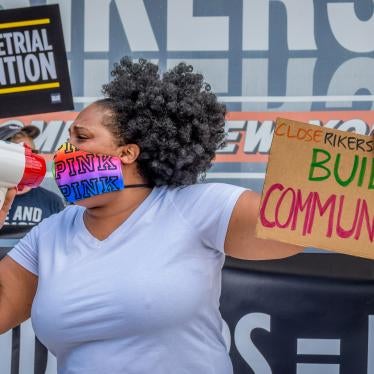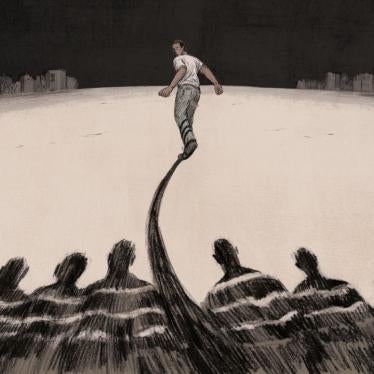The Honorable Rosa DeLauro
Chair, House Committee on Appropriations
H-307 The Capitol
Washington, DC 20515
The Honorable Kay Granger
Ranking Member, House Committee on Appropriations
H-307 The Capitol
Washington, DC 20515
Dear Chairwoman DeLauro, Ranking Member Granger, and members of the House Committee on Appropriations,
On behalf of The Leadership Conference on Civil and Human Rights, Civil Rights Corps, and the undersigned organizations, we write to urge you to support the community safety priorities outlined below in FY 2023 appropriations. All people have a basic desire to feel safe and to be safe in their communities — safe not only from violence and physical harm, but also from being profiled, targeted, or prosecuted based on their identities and life circumstances. And yet, too many U.S. communities lack this security. And too often, the “safety” investments that policymakers prioritize leave many people feeling less safe in their own communities.
Our community of criminal-legal advocates, grassroots organizations, and allies believes that a different way forward is both possible and urgently needed. We support approaching safety through a public health lens — while making bold, life-affirming investments to address violence and harm before they happen. We support interdisciplinary investments that tackle the underlying causes of violence and harm (“social determinants of safety”), such as inadequate access to food, shelter, physical and mental health care, safe and supportive schools, a clean environment, and more. We support channeling these investments through community-led institutions that operate fully outside of the criminal-legal system. We support diverting people from the criminal-legal system as early as possible — including by providing voluntary, non-carceral pretrial supports and robustly safeguarding the presumption of innocence — and support focusing on community care rather than punishment. And we support broadening our definition of “safety” so that it encompasses all of our security needs, including health, housing, equitable and high-quality education, and financial security.
The Fiscal Year 2023 appropriations is the perfect vehicle to begin embracing this comprehensive vision of safety — a vision backed by both empirical evidence and the needs of those people who have been most impacted by criminal-legal violence and systemic disinvestment. While this is not an exhaustive list of budget requests, the following Community Safety Appropriations Agenda and the Vision for Justice Appropriations Agenda are our top priorities for taking this much-needed step.
Community Safety Appropriations Agenda for FY 2023
- Investing in Non-Carceral Crisis Response & Violence Intervention and Reduction
- Expanding Treatment Capacity for Mental Health & Substance Use
- Increasing Access to Safe, Supportive & Affordable Housing
- Investing in Financial Security & Economic Justice — Using an Environmental Lens
- Investing in Equitable Education & Youth Development
1. Investing in Non-Carceral Crisis Response & Violence Intervention and Reduction
Over the years, evidence has shown that programs of violence prevention and non-carceral crisis response dramatically improve community safety — even though they have received far less funding than traditional criminal-legal approaches. Fully 80 percent of gender-based violence survivors report being somewhat or extremely afraid to call the police during a crisis. And yet, many non-police crisis responders have been highly successful at stemming violence. A study of Safe Streets, a Baltimore non-carceral “violence interruption” program, found that its outreach workers reduced serious violence by 69 percent. And robust research has shown that violence prevention programs in schools significantly reduce violent behavior.
When someone is in crisis or otherwise vulnerable, jurisdictions should have trained professionals who are available to answer these calls and defuse dangerous situations. People in crisis need a helping hand, not a gun, to help them succeed and access the supports that they need.
To that end, we recommend the following FY 2023 priorities:
- We request that the Subcommittee on Labor, Health and Human Services, Education, and Related Agencies significantly expand funding for non-carceral crisis response, including unarmed, non-police first responders. We recommend making this investment by:
- Passing and fully funding The People’s Response Act, which helps local governments increase non-carceral crisis response and other investments in community safety;
- Increasing to $40 million the dollars available through the Preventing Violence Affecting Young Lives Grant; and
- Doubling the dollars available for planning Qualifying Community-Based Mobile Crisis Intervention Services, as well as expanding grant uses to include pilot programs. We recommend further restricting “qualifying” to mean models that are fully non-carceral — that is, fully disconnected from law enforcement and the criminal-legal system.
- We request that the Subcommittee on Labor, Health and Human Services, Education, and Related Agencies provide funding for community-based organizations (CBOs), state governments, and local governments to address the “social determinants of safety” using non-carceral approaches, including through establishing local Community Safety Agencies that operate outside of the criminal-legal system. We recommend making this investment by:
- Passing and fully funding The People’s Response Act, which helps jurisdictions address the “social determinants of safety” through (1) conducting Safety Needs Assessments; (2) designing action plans based on these needs; (3) establishing “Community Safety Agencies” at the local level or “Divisions of Community Safety” at the state level; and (4) and making robust investments in non-carceral community safety-related programs and infrastructure; and
- Increasing to at least $25 million the dollars that are available through the Social Determinants of Health Accelerator Grant, but modifying this language so that the grant dollars also may specifically target the “social determinants of safety” using the model described above.
- We request that the Subcommittee on Labor, Health and Human Services, Education, and Related Agencies provide funding for violence interruption and prevention programs, neighborhood mediation programs, and safe passage to school programs. We recommend making this investment by:
- Including a $5 billion commitment to community violence intervention and committing this funding to center public health, community-led processes, and non-carceral approaches. We further request that this funding be routed exclusively through HHS and prioritize projects that are led by directly impacted community members.
2. Expanding Treatment Capacity for Mental Health & Substance Use
To implement community safety-focused programs, jurisdictions must have an adequate supply of peers and professionals who can provide voluntary, non-coercive services that support physical and mental health — and allow appropriate staffing for non-carceral crisis response and similar programs. Expanding access to basic health care has been found to reduce crime, as well as save money on legal system expenses. Research demonstrates that when the number of treatment facilities for substance use disorder increases, crime decreases in the same area. Expanded access to mental health treatment, and psychiatric treatment in particular, has been found to reduce violent crime.
Community safety cannot succeed without a robust, well-trained workforce of mental health and treatment professionals — not only because these services can reduce violence and harm, but also because physical and mental health are vitally important for safety itself. For too long, this country has taken a punishment and enforcement approach to how we address mental health, substance use, and related issues; the following investments, paired with further public health-centered policy changes, are a first step toward changing this paradigm.
To that end, we recommend the following FY 2023 priorities:
- We request that the Subcommittee on Labor, Health and Human Services, Education, and Related Agencies and the Subcommittee on Interior, Environment, and Related Agencies provide funding for a Public Health Job Corps and Community Health Workers, including people who are engaged in non-carceral crisis response, case management, and harm reduction-based treatment for mental health and substance use. We recommend making this investment by, among other avenues:
- Increase to at least $30 million the dollars available through the Behavioral Health Integration Initiative grant;
- Tripling the dollars available through the Community Health Worker and Paraprofessional training program; and
- Increasing the Health Resources Services Administration (hrsa.gov) budget for healthcare workforce training by no less than $250 million.
- We request student loan forgiveness to encompass individuals who are providing services related to non-carceral crisis response, case management, mental health, and treatment for substance use disorder. We recommend making this investment by:
- The Subcommittee on Financial Services and General Government extending through 2030 the CARES Act Provision (Sec. 278) allowing employers to make tax-exempt loan-repayment contributions of up to $5,250; and
- The Subcommittee on Labor, Health and Human Services, Education, and Related Agencies increasing to $120 million the dollars available through the Public Health Scholarship Program.
3. Increasing Access to Safe, Supportive & Affordable Housing
Stable, high-quality, affordable housing is a cornerstone of safety. At a local level, increasing access to affordable housing by building more low-income housing units has significantly reduced violent crime. In addition, extensive research has found that having stable housing decreases the likelihood of committing a crime.
To ensure that all U.S. residents can access this essential component of safety, we recommend the following FY 2023 priorities:
- We request that the Subcommittee on Transportation, Housing and Urban Development, and Related Agencies provide additional funding for rental assistance. We recommend making this investment by, among other avenues, expanding the Housing Vouchers program to reach at least an additional 200,000 people.
- We request that the Subcommittee on Transportation, Housing and Urban Development, and Related Agencies provide additional funding for the preservation of public housing. Around 10,000 public housing apartments are lost annually because they are no longer habitable. We recommend making this investment by increasing funding to the Section 9 public housing program by at least $65 billion, as proposed in Build Back Better. We further recommend repeal of the Faircloth Amendment, which sharply limits the construction of new public housing.
- We request that the Subcommittee on Transportation, Housing and Urban Development, and Related Agencies provide significant funding increases for the Fair Housing Initiatives Program, Fair Housing Assistance Program, and HUD’s Office of Fair Housing and Equal Opportunity — all critical investments that would ensure victims of discrimination can access justice, including victims of sexual and other forms of harassment.
- We request that the Subcommittee on Transportation, Housing and Urban Development, and Related Agencies provide additional funding for eviction defense. We recommend making this investment by, among other avenues, increasing the funding that is available through the Eviction Protection Grant Program to $100 million.
- We request that the Subcommittee on Transportation, Housing and Urban Development, and Related Agencies provide additional funding for establishing community land trusts. We recommend making this investment by, among other avenues, fully funding the Community Restoration and Revitalization Fund proposed in Build Back Better, which includes the development and maintenance of community land trusts as one of its intended uses.
- We request that the Subcommittee on Transportation, Housing and Urban Development, and Related Agencies provide additional funding for expanding permanent supportive housing to ensure that people experiencing homelessness, people with disabilities, and others can access affordable and sustainable housing. We recommend making this investment through, among other avenues:
- Appropriating at least $4 billion for the McKinney-Vento Homeless Assistance Grants.
- Including an appropriation for the National Housing Trust Fund, which is a large source of funding for permanent supportive housing, and other types of affordable housing for very-low income people.
4. Investing in Financial Security & Economic Justice — Using an Environmental Lens
Financial security is another critical component of safety — not only because financial security and employment opportunities help people address their basic needs, but also because these investments have been shown to increase safety. One study showed that emergency financial assistance for those experiencing economic insecurity reduced total arrests, including a 51 percent reduction in arrests for violent crimes. Short-term financial assistance has been shown to decrease violence and crime. And decreasing unemployment has been shown to reduce property crime.
Unemployment insurance (UI) provides a crucial safety net that promotes household well-being, and generous UI benefits may lower local property and violent crime rates. UI may also minimize adverse contact between the unemployed and the criminal-legal system, including by decreasing the likelihood of arrest and any corresponding inability to afford court imposed fines and fees following conviction. However, the benefits of our nation’s patchwork of unemployment insurance programs are distributed unequally, with Black workers 24 percent less likely to receive unemployment insurance than their white counterparts over the last 30 years.
We must make bold investments in economic justice so that we can address this critical building block of safety — and we must spend these dollars in a way that further addresses another safety need: environmental justice. Across the United States, many more people die each year from air pollution than from all homicides combined. Our poorest communities are those most exposed to climate-related disasters. And access to green spaces, and restoring vacant land have all been shown to reduce many types of violent crime. The bottom-line is simple: Our investments in financial security should also support environmental goals while advancing racial and economic justice. Green jobs create financial security now while building environmental safety now and in the future.
To ensure that all communities can access this essential component of safety, we recommend the following FY 2023 priorities:
- We request that the Subcommittee on Interior, Environment, and Related Agencies provide additional funding that provides sustainable or “green” job opportunities that are rooted in economic justice and advance racial equity. We recommend making this investment by, among other avenues:
- Investing fully in the Civilian Climate Corps; and
- Expanding funding available through, for example, the Green Streets, Green Jobs, Green Towns (G3) Grant Program.
- We request that the Subcommittee on Labor, Health and Human Services, Education, and Related Agencies provide funding for the Department of Labor to study and publish a model minimum federal standard for state unemployment systems, which would help eliminate racial inequities in unemployment through recommended increases in benefits duration, adequacy, eligibility, and access.
- We request that the Subcommittee on Labor, Health and Human Services, Education, and Related Agencies provide funding for the Department of Labor to reform and modernize the systems for the provision of federally funded unemployment benefits, such as those provided under the CARES Act, to ensure that state agencies are not overwhelmed by demand in periods of future periods of high unemployment and national emergency.
- We request that the Subcommittee on Labor, Health and Human Services, Education, and Related Agencies provide additional funding to support survivors — including survivors of domestic violence, sexual violence, and rape — and individuals impacted by the criminal-legal system in achieving a quality job, financial, and housing independence. Up to 60 percent of all survivors lose their job as a result of physical violence. The local public workforce system is largely inaccessible to impacted individuals. We recommend making this investment by, among other avenues, increasing by at least $1 billion the funding available through the WIOA Adult Program — and including language that specifically earmarks these dollars for survivors and impacted individuals.
5. Investing in Education & Youth
Investing in youth, education, and community spaces is essential for both boosting the economy and making communities safer and more stable. Increasing educational attainment decreases the likelihood of future incarceration. Improving school quality reduces the probability of serious crimes and incarceration. And increasing investments in counselors, social-emotional learning, and wraparound services — while reducing the use of school police — will help end the school-to-prison pipeline while helping every child succeed.
To that end, we recommend the following FY 2023 priorities:
- We request that the Subcommittee on Labor, Health and Human Services, Education, and Related Agencies fully fund the items that are proposed in the Counseling Not Criminalization in Schools Act. These items include funding for school-based counselors, trauma-informed practices, social-emotional learning programs, wraparound services, school nurses, school-based clinics, and two-generational programming at schools. We recommend making this investment by:
- Passing and fully funding the Counselors Not Criminalization in Schools Act;
- Increasing to at least $30 million funding that is available through Project Prevent Grants; and
- Tripling the funding that is available through Promise Neighborhoods.
- We request that the Subcommittee on Labor, Health and Human Services, Education, and Related Agencies provide additional funding for community schools. We recommend making this investment by, among other avenues, doing the following:
- Increasing to at least $413 million the funding that is available through the Full-Service Community Schools competitive grant program as the Biden administration called for in their FY 2022 budget; and
- Increasing to at least $4 billion the funding that is available through 21st Century Community Learning Centers.
- We request that the Subcommittee on Financial Services and General Government cancel a minimum of $50,000 of student loan debt per borrower to advance racial equity. We recommend making these changes in accordance with the Civil Rights Principles for Student Loan Debt Cancellation.
Vision for Justice Appropriations Agenda for FY 2023
Even as we invest in non-carceral, holistic approaches to community safety, we must prioritize budget decisions that dismantle existing criminal-legal injustice. To that end, we urge the following priorities when designing the FY 2023 budget:
Subcommittee on Agriculture, Rural Development, Food and Drug Administration, and Related Agencies
- Remove the collateral consequences of conviction, as related to programs that are funded in annual appropriations, such as the drug felony bans for SNAP and TANF programs.
- Increase federal financial aid and PELL grants.
Subcommittee on Commerce, Justice, Science, and Related Agencies
- Prohibit the use of federal funding as a way of expanding federal law enforcement engagement, including under Operation Legend or Operation Relentless Pursuit.
- Prohibit all funds from the U.S. Department of Agriculture’s Community Facilities (CF) loan and grant programs for jail and prison construction, expansion, operation, or equipment.
- Require full implementation of the Juvenile Justice and Delinquency Prevention Act (JJDPA) by appropriating $350 million for Titles II and V of the Act in FY 2023 budget.
Thank you in advance for your consideration of our budget priorities. We would appreciate the opportunity to meet with the appropriate staff to discuss these issues at your earliest convenience. If you have questions or concerns, please feel free to contact Thea Sebastian, policy director at Civil Rights Corps, at thea@civilrightscorps.org, or Bree Spencer, senior manager — policing at The Leadership Conference on Civil and Human Rights, at spencer@civilrights.org.
Signed,
The Leadership Conference on Civil and Human Rights
Civil Rights Corps
American Friends Service Committee
American Humanist Association
Bend the Arc: Jewish Action
BLM Global Network Foundation
Color of Change
Essie Justice Group
FreeFrom
Human Rights Campaign
Human Rights Watch
Japanese American Citizens League
Justice Strategies
League of Women Voters of the United States
Local Progress
MoveOn
NAACP Legal Defense and Educational Fund, Inc.
National Alliance to End Homelessness
National Council of Churches
National Employment Law Project
National Housing Law Project
National Immigration Project of the National Lawyers Guild
NETWORK Lobby for Catholic Social Justice
Partners In Health
Pax Christi USA
People For the American Way
Sojourners
Southern Poverty Law Center Action Fund
The Bail Project
The Movement for Black Lives
United Church of Christ, Justice and Local Church Ministries








